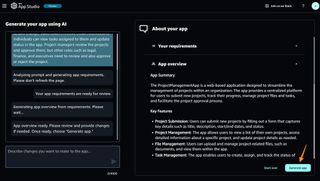AWS App Studio lets users create custom applications in minutes using AI
The new AWS App Studio platform will come with built-in governance tools to maintain oversight over application development

Amazon Web Services (AWS) has unveiled the launch of the new AWS App Studio, a natural language development platform for enterprises that can be used to create applications in just minutes.
According to the firm, users can create enterprise-grade applications by giving simple descriptions of what they want out of it, how they want the app to function, and what data sources the application will draw from.
The product’s “ease of use” is its standout feature, according to Sriram Devanathan, AWS’ GM of Amazon Q, who told ITPro a bit more about the interaction a potential user might have with the platform.
“You can have a real-life conversation with it and, once you're done - you think you have the requirements and features kind of nailed down - you can say, ‘go generate the app,’ and what it will do is generate a full-featured app,” Devanathan said.
Once created, users can modify applications by using a “point-and-click” interface within the platform. They can also ask the built-in generative AI assistant if they need guidance on solving a particular problem.

AWS claimed that a scarcity of development resources means many internal applications “do not get built”, pushing employees towards low-code tools that themselves “come with their own challenges.”
“Current low-code tools often have a steep learning curve, requiring platform-specific knowledge, and the applications that users build often do not meet their company’s security requirements,” AWS said.
Get the ITPro. daily newsletter
Sign up today and you will receive a free copy of our Focus Report 2025 - the leading guidance on AI, cybersecurity and other IT challenges as per 700+ senior executives
This new app studio is the firm’s solution to this problem, an AI-powered tool it claims doesn’t sacrifice enterprise-grade requirements.
AWS App Studio looks to challenge OpenAI’s GPT Store
After OpenAI released its comparable GPT Store last year, some industry stakeholders raised quality concerns surrounding AI-generated development platforms.
While the GPT Store was a consumer-focused product and one designed specifically with custom chatbots in mind, experts at the time said oversimplified development processes could lead to a dilution of quality and security.
Responding to a question on this, however, Devanathan said that AWS App Studio has built-in features that protect individual organizations from a proliferation of low-quality apps.
“We bake security and governance into the core of all the products, so there is an admin portal within App Studio that allows an admin to see all the apps that are built,” Devanathan told ITPro.
This acts as a “governance function” within the platform, he added, allowing organizational oversight to ensure companies are “building only the apps that are required.” Devanathan this ultimately enables enterprises to do “what’s best for them.”
Quality concerns around AI-generated platforms
Speaking to ITPro at the time of the GPT Store’s release in 2023, futurist Theo Priestley said app development could be driven down to a speed of minutes, potentially flooding the store with low-quality products or weak clones of other GPTs.

Priestley also cited security concerns in his criticism of the GPT Store, talking specifically about “business users” who could create their own apps without IT knowledge and breach internal regulations.
He described the platform as “worse” than no-code and low-code app generation platforms, lamenting a “new generation of throwaway apps” set to be created within businesses and enterprises.
AWS App Studio is a very different product in that it’s designed to be used internally and has guardrails that help protect enterprises from the same sort of problems. The same worries could apply if businesses using the platform fail to utilize these guardrails, though.

George Fitzmaurice is a staff writer at ITPro, ChannelPro, and CloudPro, with a particular interest in AI regulation, data legislation, and market development. After graduating from the University of Oxford with a degree in English Language and Literature, he undertook an internship at the New Statesman before starting at ITPro. Outside of the office, George is both an aspiring musician and an avid reader.

‘Frontier models are still unable to solve the majority of tasks’: AI might not replace software engineers just yet – OpenAI researchers found leading models and coding tools still lag behind humans on basic tasks

Java developers are facing serious productivity issues: Staff turnover, lengthy redeploy times, and a lack of resources are hampering efficiency – but firms are banking on AI tools to plug the gaps













